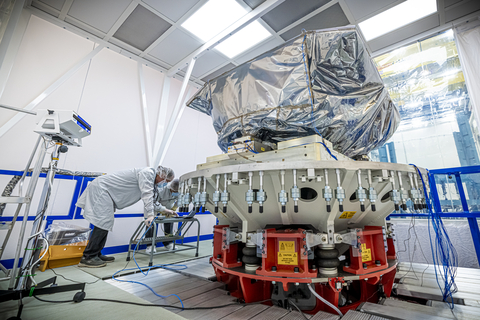Testing of Roman Space Telescope’s Primary Instrument Nearing Completion at BAE Systems

The Nancy Grace Roman Space Telescope’s Wide Field Instrument, the primary scientific instrument on NASA’s next-generation observatory, has entered the final stages of environmental testing at BAE Systems in
The WFI will detect distant infrared light from around the universe and provide high-resolution images across wide swaths of the sky, helping scientists find and study new exoplanets, better understand dark energy and dark matter, and explore a range of additional astronomical questions. The instrument will capture a field of view at least 100 times greater than its predecessor, the Hubble Space Telescope, and will dramatically increase the speed with which we can survey the cosmos.
BAE Systems and NASA’s Goddard Space Flight Center finished integration of the WFI and began environmental testing of the instrument in September 2023. To date, the WFI has successfully completed vibration and acoustic tests that simulate launch conditions and its initial baseline thermal vacuum test, which simulates the conditions the WFI will encounter in space, including the temperature on orbit. Most recently, the WFI completed its second thermal vacuum chamber test, which served as a final demonstration of its performance after being subjected to dynamic environments testing. The instrument will now transition to the final stage of testing, where it will undergo electromagnetic interference and compatibility testing to make sure it’s not susceptible to electrical disruptions.
Completion of environmental testing and delivery of the WFI to NASA’s Goddard Space Flight Center is expected to occur later this summer.
“The WFI is an incredibly sensitive instrument, and these tests are vital to ensure its performance and safeguard the success of this groundbreaking mission,” said Dr. Alberto Conti, vice president and general manager of Civil Space for BAE Systems Space & Mission Systems. “We’re proud to continue our legacy of supporting every NASA astrophysics flagship mission and look forward to completing this next milestone in its development.”
In addition to performing integration and environmental testing, BAE Systems designed and built the instrument’s opto-mechanical assembly, which includes the optical bench, element wheel, thermal control system and alignment compensation mechanism, among other features. NASA’s Goddard Space Flight Center built the focal plane system (FPS), relative calibration system, diffractive elements for the element wheel, and the instrument command and data handling electronics.
The Roman Space Telescope is expected to launch by May 2027.
View source version on businesswire.com: https://www.businesswire.com/news/home/20240521846376/en/
Sawyer D’Argonne, BAE Systems
Mobile: 303-250-6031
sawyer.dargonne@baesystems.us
www.baesystems.com/US
@BAESystemsInc
Source: BAE Systems







